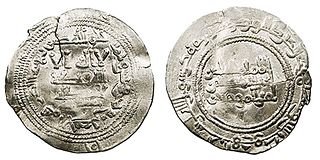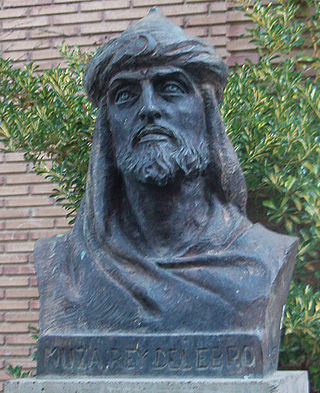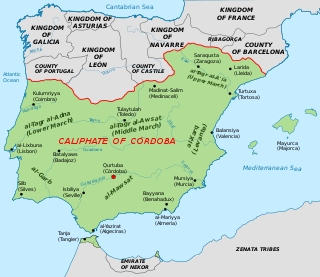
Abd al-Rahman ibn Mu'awiya ibn Hisham, commonly known as Abd al-Rahman I, was the founder and first emir of the Emirate of Córdoba, ruling from 756 to 788. He established the Umayyad dynasty in al-Andalus, which continued for nearly three centuries.

ʿAbd al-Raḥmān ibn Muḥammad ibn ʿAbd Allāh ibn Muḥammad ibn ʿAbd al-Raḥmān ibn al-Ḥakam al-Rabdī ibn Hishām ibn ʿAbd al-Raḥmān al-Dākhil, or simply ʿAbd al-Raḥmān III, was the Umayyad Emir of Córdoba from 912 to 929, at which point he founded the Caliphate of Córdoba, serving as its first caliph until his death. Abd al-Rahman won the laqab (sobriquet) al-Nāṣir li-Dīn Allāh in his early 20s when he supported the Maghrawa Berbers in North Africa against Fatimid expansion and later claimed the title of Caliph for himself. His half-century reign was known for its religious tolerance.

Abu al-As al-Hakam ibn Hisham ibn Abd al-Rahman was Umayyad Emir of Cordoba from 796 until 822 in Al-Andalus.
Bernardof Septimania (795–844), son of William of Gellone and cousin of Charlemagne, was the Duke of Septimania and Count of Barcelona from 826 to 832 and again from 835 to his execution, and also Count of Carcassonne from 837. He was appointed to succeed the third Count of Barcelona, Rampon. During his career, Bernard was one of the closest counsellors of the Emperor Louis the Pious, a leading proponent of the war against the Moors, and was an opponent of the interests of the local Visigothic nobility in Iberia.
Sulayman ibn Yaqzan al-Kalbi al-Arabi was an Arab Muslim wāli (governor) of Barcelona and Girona in the year 777.
Abu Tawr was wali of Washka, a Muslim nobleman, perhaps member of the Banu Salama clan. Alternatively, it has been suggested that he may be the individual Al-Andalus genealogist Ibn Hazm named as Abu Tawr ibn Qasi, son of the eponymous ancestor of the powerful Muwallad Banu Qasis.
Husayn of Zaragoza was a descendant of Sa'd ibn Ubadah the companion of Muhammad, and the Wali (governor) of Zaragoza from 774 to 781.
Ayxun or Aissó was a nobleman who led a revolt in Barcelona, Ausona, and Girona in 826 to 827. His identity is uncertain.

Muhammad ibn Abi Bakr ibn Abi Quhafa al-Taymi was an Arab Muslim commander in the service of the fourth Rashidun caliph and first Shia Imam, Ali ibn Abi Talib. Muhammad was the youngest son of the first Rashidun caliph Abu Bakr and Asma bint Umays. He had his son, Al-Qasim taught by his aunt, Aisha, and by Ibn Abbas. Which is why many Hadiths are quoted through Muhammad and his son and thus were the source of much of the information of Islam and narrations available today.
This is a timeline of notable events during the period of Muslim presence in Iberia, starting with the Umayyad conquest in the 8th century.

The Muslim conquest of the Iberian Peninsula, also known as the Arab conquest of Spain, by the Umayyad Caliphate occurred between approximately 711 and the 720s. The conquest resulted in the destruction of the Christian Visigothic Kingdom of Spain and led to the establishment of a Muslim Arabian-Moorish state, Al-Andalus.
The Banu Tujib, the Tujibids or Banu al-Muhajir, were an Arab dynasty on the Upper March of Al-Andalus active from the ninth to the eleventh centuries. They were given control of Zaragoza and Calatayud by the Umayyads as a counterweight to the independence-minded Muwallad nobility of the region. In Zaragoza, they developed a degree of autonomy that served as the precursor to their establishment of an independent Taifa of Zaragoza after the collapse of the Caliphate of Córdoba. They ruled this taifa from 1018 until they were expelled by another Arab dynasty, the Banu Hud, in 1039. An exiled junior line of the family, known as the Banu Sumadih, established themselves as rulers of the Taifa of Almería, which they held for three generations, until 1090.
Abdul Malik is an Arabic male given name and, in modern usage, surname. It is built from the Arabic words Abd, al- and Malik. The name means "servant of the King", in the Christian instance 'King' meaning 'King of Kings' as in Jesus Christ and in Islam, Al-Malik being one of the names of God in the Qur'an, which give rise to the Muslim theophoric names.

Musa ibn Musa al-Qasawi (Arabic: موسى بن موسى القسوي) also nicknamed the Great ; died 26 September 862) was leader of the Muwallad Banu Qasi clan and ruler of a semi-autonomous principality in the upper Ebro valley in northern Iberia in the 9th century.
Abū ʿAbd al-Raḥmān Muḥammad ibn Marwān ibn al-Ḥakam was an Umayyad prince and one of the most important generals of the Umayyad Caliphate in the period 690–710, and the one who completed the Arab conquest of Armenia. He defeated the Byzantines and conquered their Armenian territories, crushed an Armenian rebellion in 704–705 and made the country into an Umayyad province. His son Marwan II was the last Umayyad caliph.

The Emirate of Córdoba, from 929, the Caliphate of Córdoba, was an Arab Islamic state ruled by the Umayyad dynasty from 756 to 1031. Its territory comprised most of the Iberian Peninsula, the Balearic Islands, and parts of North Africa, with its capital in Córdoba. From 756 it was ruled as an emirate until Abd al-Rahman III adopted the title of caliph in 929.
The Umayyad dynasty or Umayyads was an Arab clan within the Quraysh tribe who were the ruling family of the Caliphate between 661 and 750 and later of al-Andalus between 756 and 1031. In the pre-Islamic period, they were a prominent clan of the Meccan tribe of Quraysh, descended from Umayya ibn Abd Shams. Despite staunch opposition to the Islamic prophet Muhammad, the Umayyads embraced Islam before the former's death in 632. Uthman, an early companion of Muhammad from the Umayyad clan, was the third Rashidun caliph, ruling in 644–656, while other members held various governorships. One of these governors, Mu'awiya I of Syria, opposed Caliph Ali in the First Muslim Civil War (656–661) and afterward founded the Umayyad Caliphate with its capital in Damascus. This marked the beginning of the Umayyad dynasty, the first hereditary dynasty in the history of Islam, and the only one to rule over the entire Islamic world of its time.
Abd al-Malik ibn Umar ibn Marwan ibn al-Hakam, also known as al-Marwani, was an Umayyad prince, general and governor of Seville under the first Umayyad emir of al-Andalus, Abd al-Rahman I. He led two major campaigns in 758 and 774, the first against the previous ruler of al-Andalus Yusuf ibn Abd al-Rahman al-Fihri and the second against the rebellious troops of Seville and Beja. His victories solidified the Umayyad emirate's control of western al-Andalus. His descendants continued to play important political and military roles in the Emirate well into the 10th century.
The siege of Barcelona was a military operation by a Carolingian army with the aim of conquering the city of Barcelona, which had been under Muslim control for 80 years. The siege and conquest were part of the expansion of the Marca Hispanica and the constitution of the County of Barcelona by the Carolingians.
Rumahis ibn Abd al-Aziz al-Kinani was the governor of Jund Filastin under the Umayyad caliph Marwan II and the governor of Algeciras under the Umayyad Emir of Cordoba, Abd al-Rahman I.






